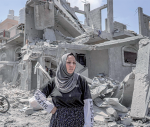You are here
Study calls for safeguarding rights of people living with HIV
By Maram Kayed - Dec 26,2020 - Last updated at Dec 26,2020
AMMAN — As the International AIDS Awareness Month comes to an end, a study recommended the necessity of developing a national plan based on a human rights approach to protect and respect the rights of people living with HIV.
The study, prepared by human rights legal expert Riad Sobh in cooperation with the Forces of Change Centre for Community Empowerment, calls Jordanian institutions to comply with “international human rights law obligations without any discrimination against people with communicable diseases”.
It also called for the “review of legislation to determine the extent to which Jordan fulfills its obligations towards the rights of people living with HIV”.
Health professionals on the other hand are celebrating Jordan’s place among the countries with the lowest AIDS rates in the world, according to the Ministry of Health.
Hadeel Ashaari, the director of the ministry’s communicable diseases department, told The Jordan Times earlier that a survey conducted in December of 2018 covering all communicable diseases showed that around 260 Jordanians were diagnosed with AIDS at the time.
The study prepared by Sobh titled “The Rights of People Living with the Human Immunodeficiency Virus (HIV) that Causes AIDS According to Human Rights Agreements,” said it “highlights the rights of women and children infected with HIV as they are in vulnerable situations and face ample discrimination by law enforcement, service providers and society”.
Although the International Health Regulations require UN member states to put in place an “adequate and effective legal framework” to prevent the spread of communicable diseases, the study said that “the restrictions imposed on travel on the basis of HIV infection cannot be justified”.
“It has been made clear that the disease cannot be transmitted through accidental contact and that its presence does not threaten public health,” it added.
The study considered that the compulsory examination test in some countries, the fear of discriminatory treatment and the ban on residence and travel for people living with HIV in some countries “create an unreal sense of unsafety and prevents some people from seeking help for the disease”.
“These measures do not ultimately protect public health, but rather undermine the response to AIDS, and lead to the reluctance of patients to obtain the prevention, treatment and care services they need access to, even when these services are available,” noted the creators of the study.
The ministry noted that those diagnosed with HIV mainly contracted it through sexual intercourse and not through infected needles or other publicly shared items.
“Health clinics in Jordan follow a strict hygiene code when it comes to items allocated for multi-usage, and most, if not all, use disposables,” said Hiyam Sarayrah, a doctor at the ministry, in previous remarks to The Jordan Times.
Out of the 260 HIV-positive citizens, 229 are currently receiving free treatment at various medical centres across the Kingdom, according to Ashaari.
She added that the treatment is offered free of charge to citizens, while foreigners are deported “immediately”.
The department’s former director Nashaat Taani noted said: “As soon as citizens are diagnosed, we refer them to the nearest health clinic and track their latest activities, whether they had accidentally communicated the disease to someone else”.
He noted that the treatment is “highly effective” and that “patient’s life expectancy increases after receiving it”.
The total number of patients diagnosed with HIV in Jordan, including deaths, stands at around 450, Sarayrah said.
Related Articles
AMMAN — On World AIDS Day, which falls on December 1, health professionals are celebrating Jordan's place among the countries with the lowes
AMMAN — The incidence of HIV/AIDS in Jordan is still around the average, with 103 cases registered in 2016 compared to 101 reported cases in
AMMAN — Calls are growing to expand psychological and social support for people living with HIV/AIDS in Jordan. The human immunodeficie
















